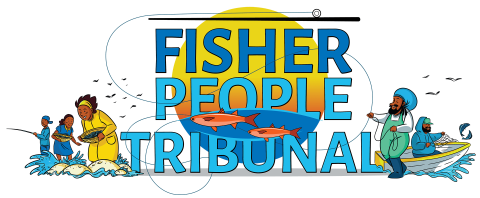Fishing for Justice Fisher People Reclaiming Land and Sea in South Africa
Topics
The Transnational Institute has supported Masifundise for many years in their efforts to strengthen the rights and voices of small-scale fishers in South Africa. This long-standing collaboration has contributed to building community power and supporting grassroots organising. The Fisher People Tribunal stands as an important step, a moment of collective courage and solidarity that brought visibility to long-standing injustices and helped lay the foundation for continued advocacy and change.

The Fisher People Tribunal, hosted by Masifundise and Coastal Links, marked the first People’s Tribunal in South Africa focused specifically on fisher people and their communities. This grassroots initiative created a powerful space for truth-telling, resistance, and solidarity, highlighting the deep-rooted injustices faced by traditional fishing communities. Despite post-apartheid promises of inclusion and transformation, fisher people have largely remained excluded from policy processes, denied access to traditional fishing grounds, and subjected to harassment and criminalisation. The Tribunal not only exposed these ongoing human rights and environmental violations but also celebrated the cultural, ecological, and food-providing contributions of fishing communities.
The Fisher People Tribunal Hearings brought together fisher representatives from five provinces, civil society organisations, academics, and legal experts. Six cases, detailing instances of ocean and land grabbing and the violation of fishing communities’ human rights, were presented to a jury through testimonies, charge sheets, and supporting evidence. Hundreds of fishers helped shape the process by sharing their experiences and testifying. Coastal Links played a key role in identifying critical issues and coordinating community participation, making the Tribunal a landmark event in the struggle for fishers’ rights.
The testimonies revealed that, despite the introduction of the Small-Scale Fisheries Policy (SSFP), small-scale fishers remain marginalised, with promises of inclusion largely unfulfilled. Inland fishers, such as those living near the Gariep Dam, reported being denied recognition and access to traditional fishing areas, while often being criminalised for engaging in customary livelihood practices. In places like iSimangaliso Wetland Park and Dwesa-Cwebe, conservation models rooted in colonial logic have restricted Indigenous access and even led to violence and displacement. The expansion of mining, offshore oil and gas drilling, and green hydrogen projects poses a growing threat to marine ecosystems and fisher livelihoods.
Climate change compounds these pressures. Coastal communities—especially women working in the intertidal zone—are on the frontlines of extreme weather events, rising sea levels, and ecosystem collapse. Yet their vital contributions to food security and local economies are often overlooked.
“We live in the ocean, so people cannot just throw dirt in the sea,” said Thozi Mthiyane, a fisher from Umgababa, KwaZulu-Natal. “We do not go to the sea to play, but to be able to take our children to school.”
The Tribunal also heard harrowing accounts of criminalisation and cultural erasure. Philasande Gangaqa, a young fisher from Willowvale in the Eastern Cape, shared how traditional healers are barred from practising near the sea, while researchers are freely granted access.
“We are criminalised for fishing on our own land,” he said.
Another fisher, Salvester Don from Ebenhaeser, expressed deep concern about extractive industries occupying the ocean:
“I don’t know if we as [fishing] communities have another generation to live out of this ocean.”
On 23 April 2025, the Fisher People Tribunal Jury Verdict was officially published. After reviewing detailed evidence and testimonies, the jury delivered a powerful judgment with strong political messages. The verdict was clear: the South African government has systematically undermined the Small-Scale Fisheries Policy and the Marine Living Resources Act (MLRA). Implementation failures—from exclusionary registration processes to improperly structured cooperatives—have perpetuated inequality and caused real harm to small-scale fishing communities.
A second key finding was the state’s bias toward commercial and extractive interests under the ocean economy agenda, which prioritises the exploitation of ocean resources for profit. Government policies, driven by neoliberal economic models like Operation Phakisa, elevate industrial fisheries, aquaculture, and recreational subsectors over the rights and livelihoods of traditional fishers. This trend has facilitated widespread environmental degradation and social dislocation, without meaningful consultation or consent.
Perhaps most disturbing was the Tribunal’s third key finding: the prevalence of human rights violations and violence against small-scale fishers. The jury heard deeply emotional testimonies of shootings, beatings, and harassment—especially in protected areas patrolled by park rangers. The state’s consistent failure to investigate or hold perpetrators accountable has left communities traumatised and disillusioned. The verdict calls for an urgent government inquiry into the use of force by conservation authorities and for mechanisms to ensure justice and redress.
In today’s unpredictable political landscape—marked by creeping authoritarianism, billionaire influence, and the rise of right-wing governments that increasingly silence grassroots voices—the Tribunal stands as a powerful act of collective defiance. It reclaims the narrative from the margins, aiming to place fisher people at the centre of conversations about natural resource governance.
More than a symbolic gesture, the Tribunal signals a renewed commitment to building alliances—with other fishers, working people’s movements across South Africa and globally, and broader struggles for food sovereignty, environmental justice, social justice, and economic equity.
The way forward lies in unity and resistance. Fisher people are not passive victims of state failure; they are leaders, organisers, and defenders of life-sustaining knowledge systems. Their struggle is a fight for survival, culture, and justice. As the verdict affirms, true transformation will only come when policies reflect realities on the ground—when access to natural resources is equitable and just, and when the rights of fisher people are fully recognised and protected.